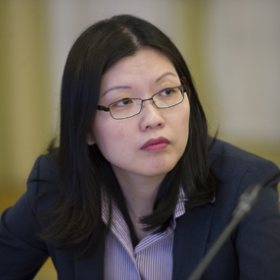
EWI’s Piin-Fen Kok Featured on Channel NewsAsia
Piin-Fen Kok, director of EWI’s China, East Asia and United States Program, appeared on Channel NewsAsia’s Between the Lines on May 28, 2014 to speak about the recent U.S. indictments of five Chinese military officers accused of hacking U.S. businesses as well as the broader dispute over cybersecurity in U.S.-China relations.
In a conversation with Between the Lines presenter Teymoor Nabili and former FBI officer Stephen Cutler, Kok commented on possible U.S. objectives for issuing these indictments and their potential consequences for U.S.-China relations. She also addressed concerns of U.S. businesses about protecting intellectual property and stressed the need to establish “rules of the road” for general cyber activities.
Excerpts from her comments:
On U.S. intentions for issuing the indictments:
“I think the short answer is that it’s [the U.S.] fed up. It’s attempted dialogue and more recently, it’s even attempted transparency in explaining to the Chinese what it’s doing on the cyber front and its concerns. And those have fallen on deaf ears. What the U.S. government is really trying to do is, number one, to show [the Chinese that] it is a really, serious, top priority problem to the U.S. government and to U.S. businesses…and second, the government wants to demonstrate to U.S. businesses that it is serious about addressing this issue that has been plaguing U.S. businesses and the economy for many years.”
On China’s response to the indictments:
“I do think that everyone concerned expected the reaction from the Chinese. Pretty predictably, they have cut off certain government-to-government exchanges, especially on the cyber front, and [will] possibly [do so] on the military-to-military front too. And they’ve also taken some retaliatory actions, as we have seen, against U.S. businesses. Besides signaling very strongly and explicitly how seriously the U.S. government takes it, I think the U.S. is also trying to preempt and do a bit of damage control, so to speak, in light of the Snowden revelations, that it is still moving ahead with these very strong and resolute actions on the issue of economic espionage.”
On the prospects for advancing dialogue between the U.S. and China on cyber issues:
“The U.S. government knows full well that to the Chinese, face saving is very important, which is why, for all these years, they have refrained from such strong measures [as issuing indictments]. That was the whole purpose of initiating discreet dialogue…trying to get the Chinese into a constructive dialogue on some of these issues and concerns, not just low-hanging fruit, like common vulnerabilities, cybercrime, and all that, but also getting to more of the core of the problem, which is the issue of economic espionage and commercial theft.”
On the impact of the indictments on U.S. businesses:
“To a certain degree, I think there is some bafflement and a good degree of concern among U.S. businesses about the implications of their ability to do business in China, which has been difficult to start with. I don’t think that these challenges that U.S. [companies], especially tech companies, face in China are anything new. This will be an exacerbation of ongoing challenges. I’m not sure that this will necessarily lead to a full-fledged trade war, simply because the two economies are very intertwined and interdependent, and to be very honest, China is experiencing a period of slowing growth. It doesn’t need anything else to make its growth or economy more difficult than it already is… I do think from the Chinese point of view, this opens the door and provides added justification for it to promote, to an even greater degree, domestic firms in the tech industry.”
On the distinction between economic and non-economic espionage:
“I do think that there is a distinction. Without going into specifics of what within the realm of non-economic espionage is acceptable or not, in general the notion of countries spying on one another has been going on, regardless of whether it’s in the cyber realm or otherwise—the old-school way. And I think…it’s important to establish rules of the road for cyber activities in general, whether it’s espionage for national security purposes…or commercial theft.”
On the U.S. loss of moral high ground on cyber issues:
“To a certain degree…the moral high ground of the U.S. has been undermined by what Edward Snowden has revealed. That said, I do think that there is a legitimate concern on the part of the U.S. as an economy whose growth has been based largely on innovation. And if you want to protect your companies and you want to protect your economy, you have to take measures against others stealing what your companies have invested and put in, and protect that essentially.”

